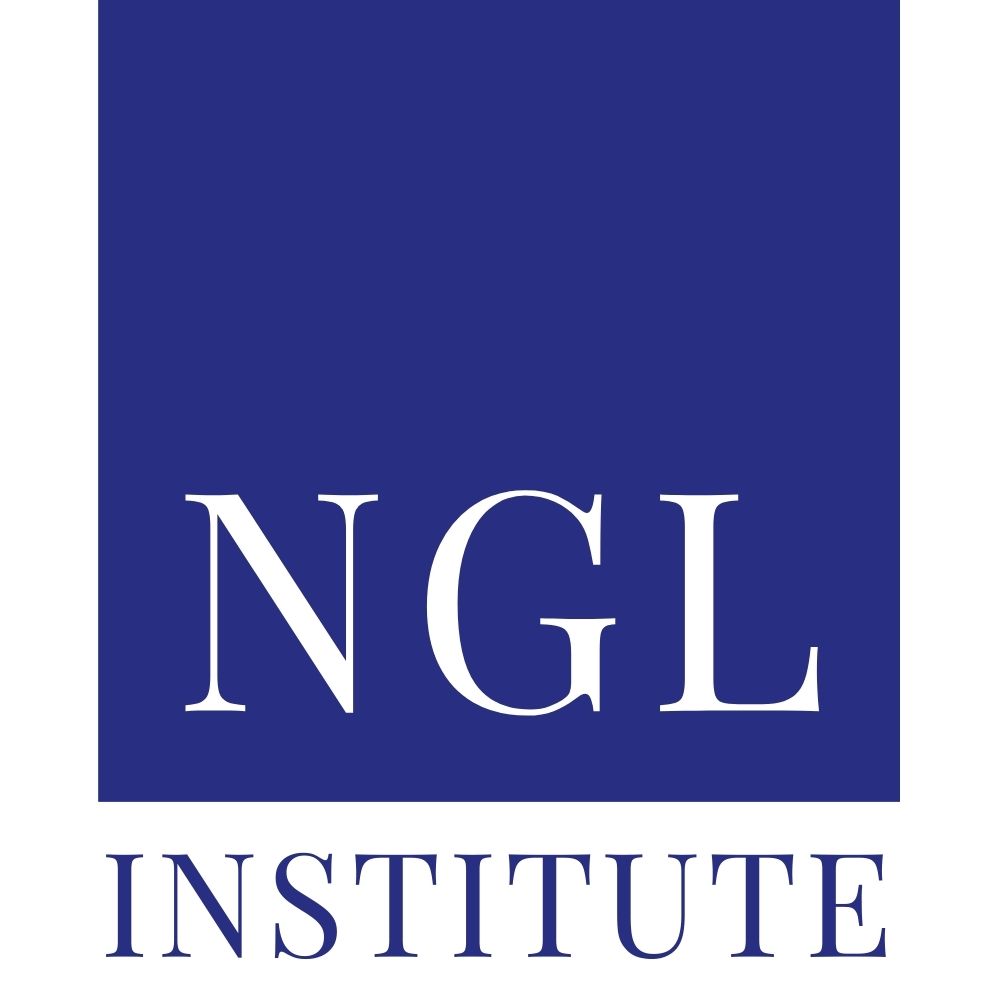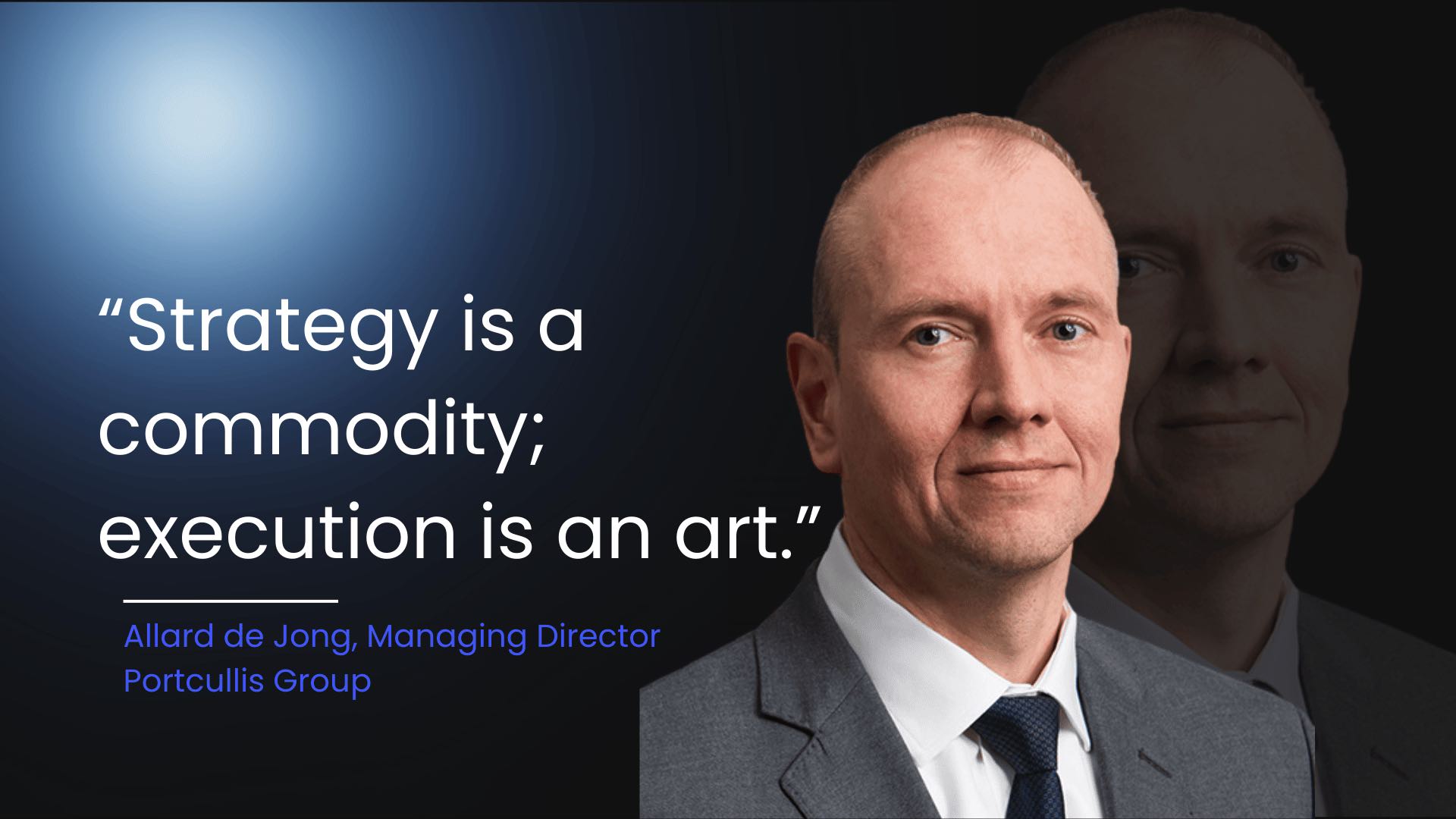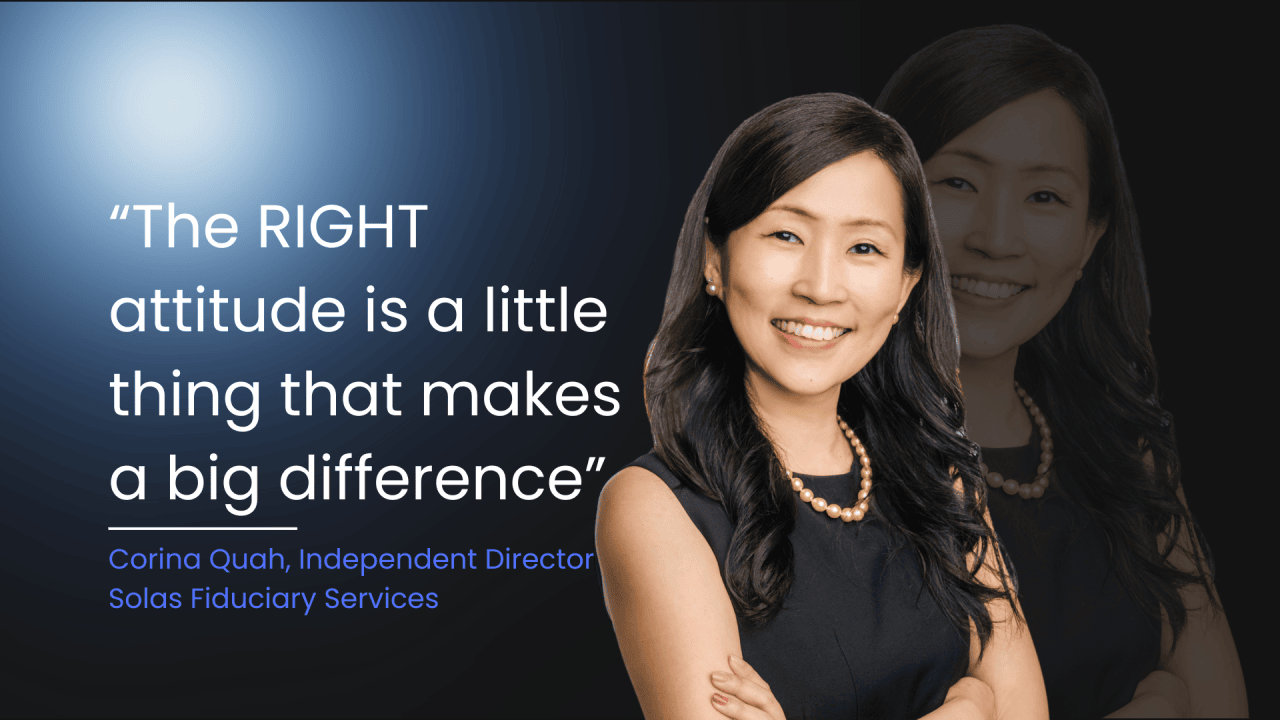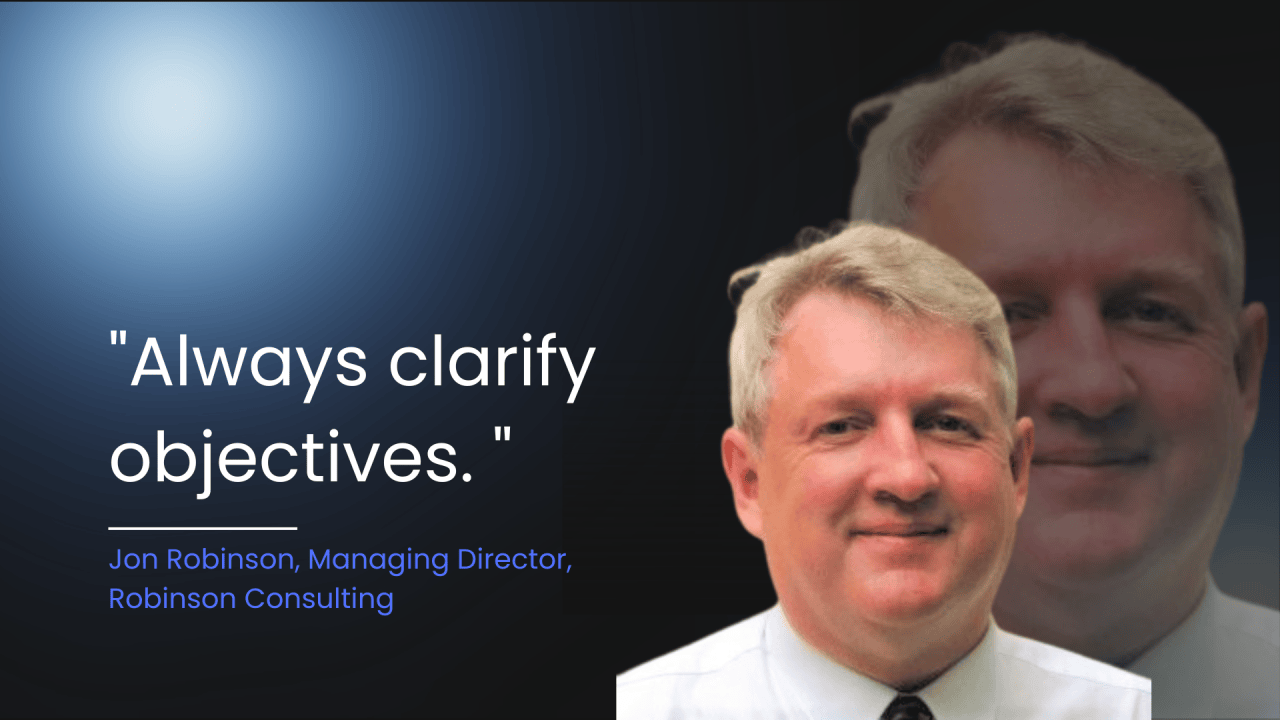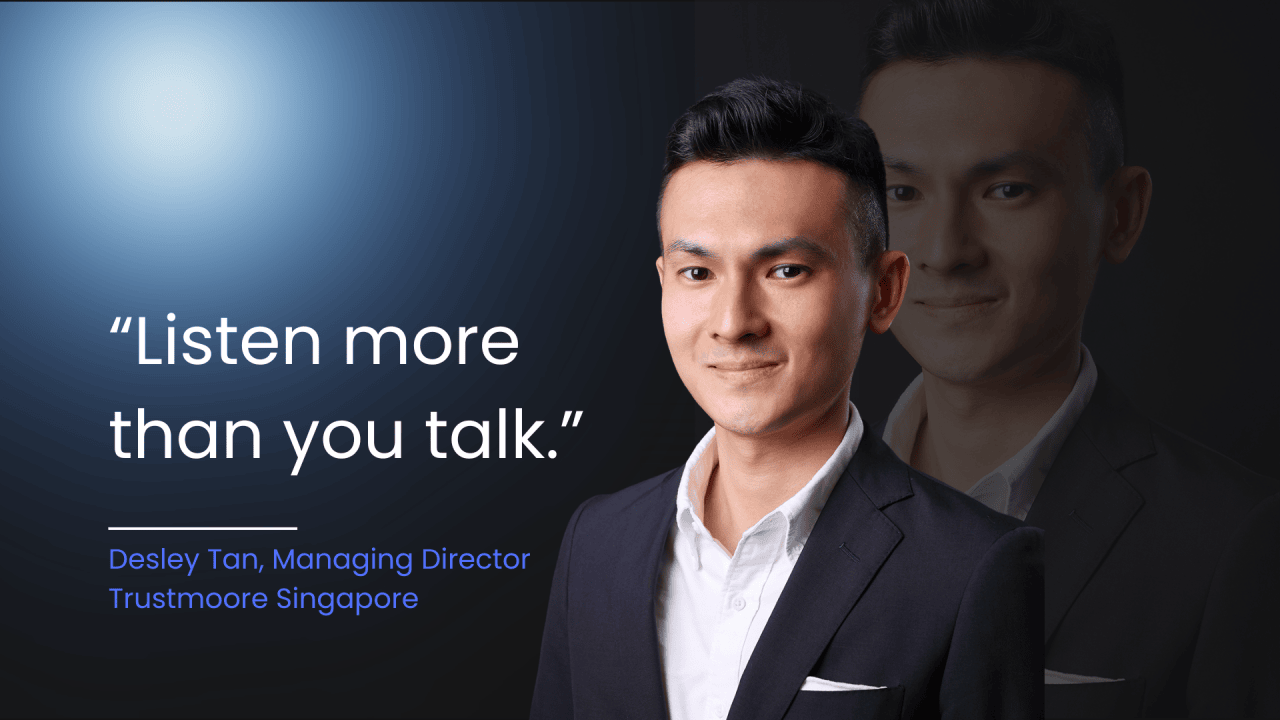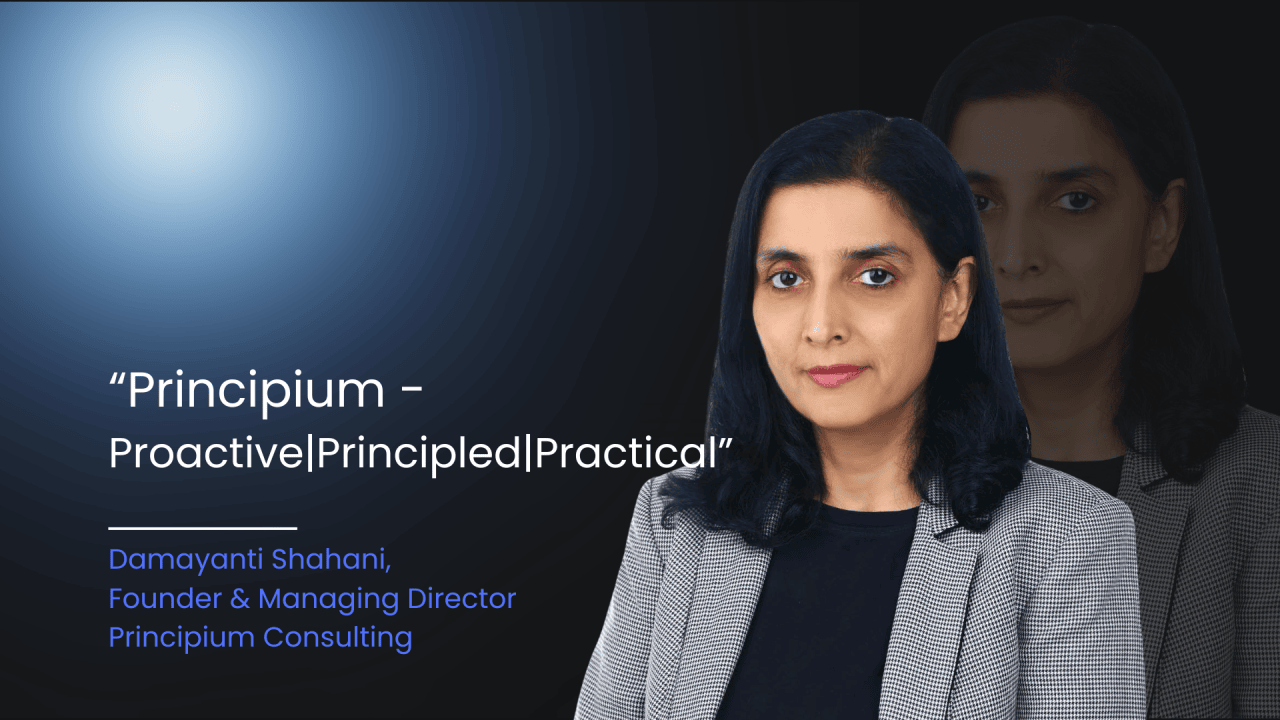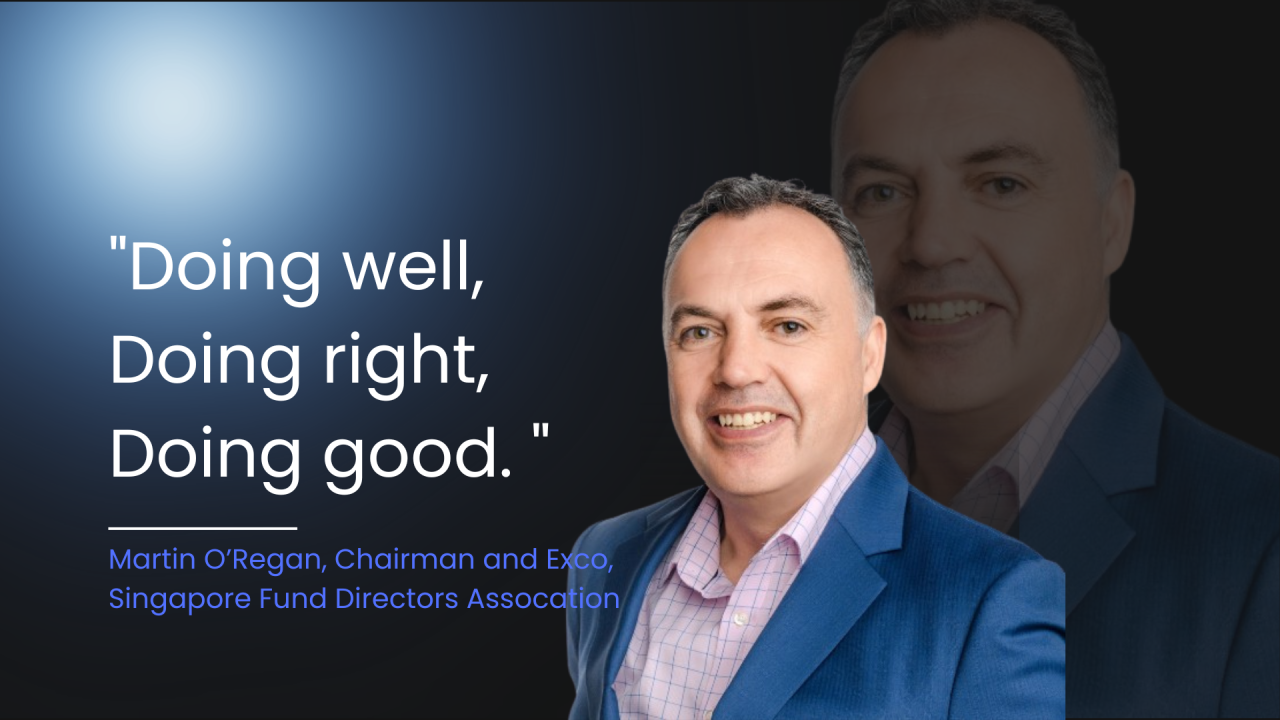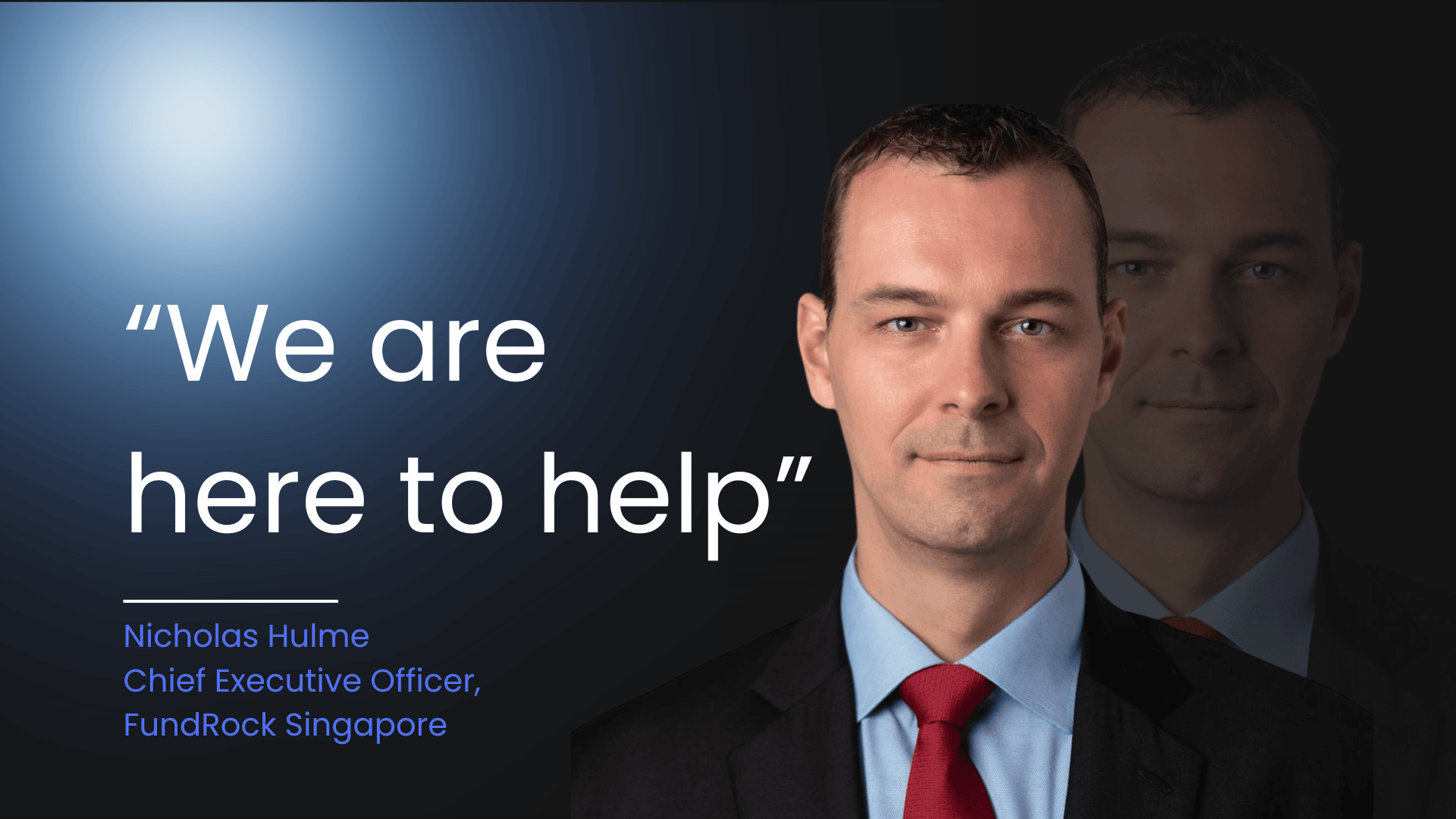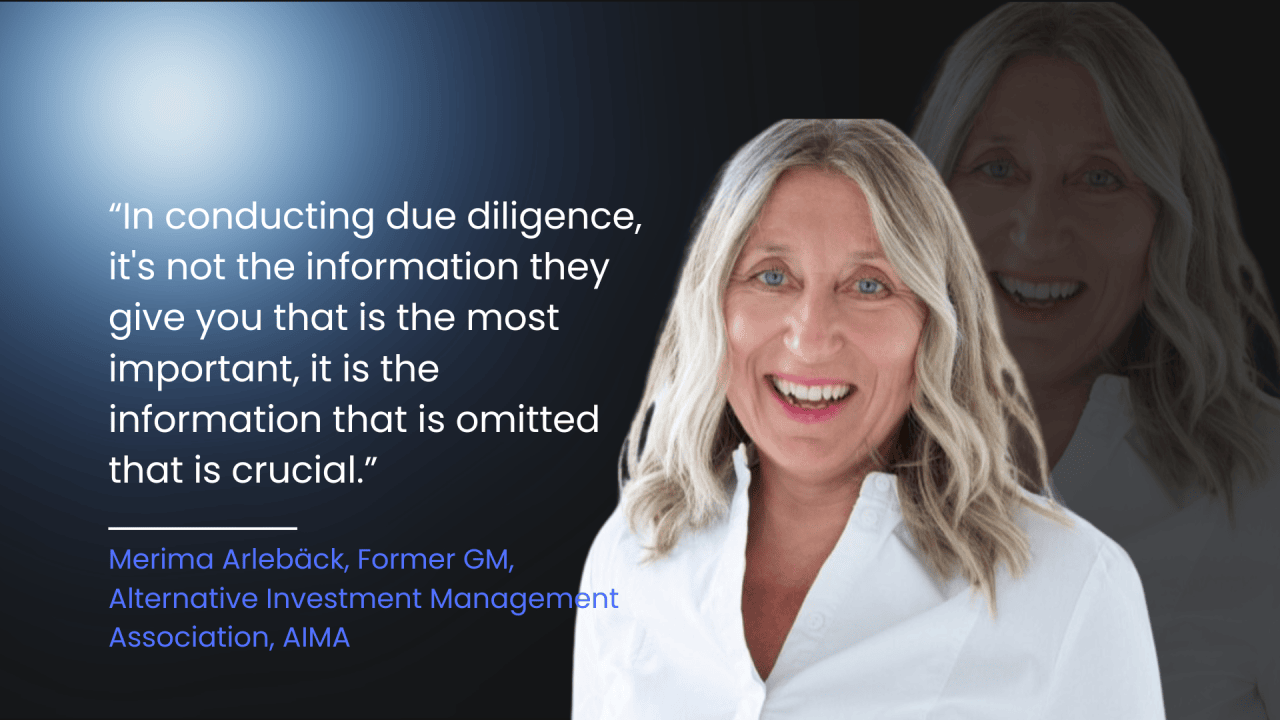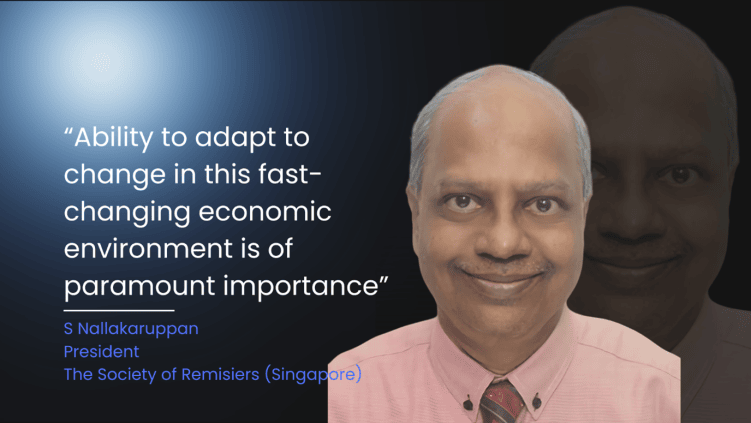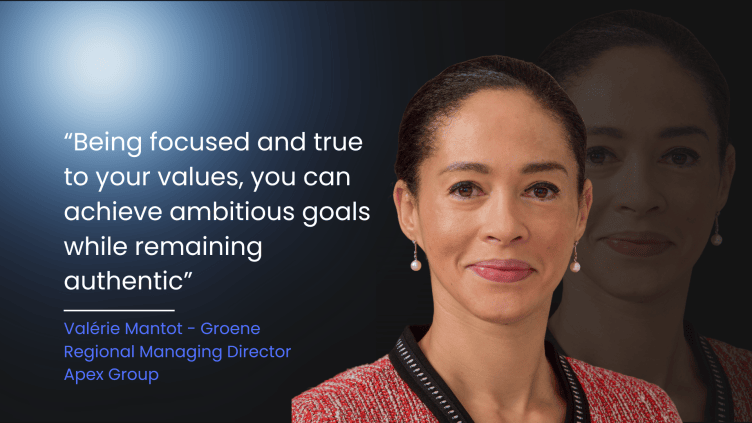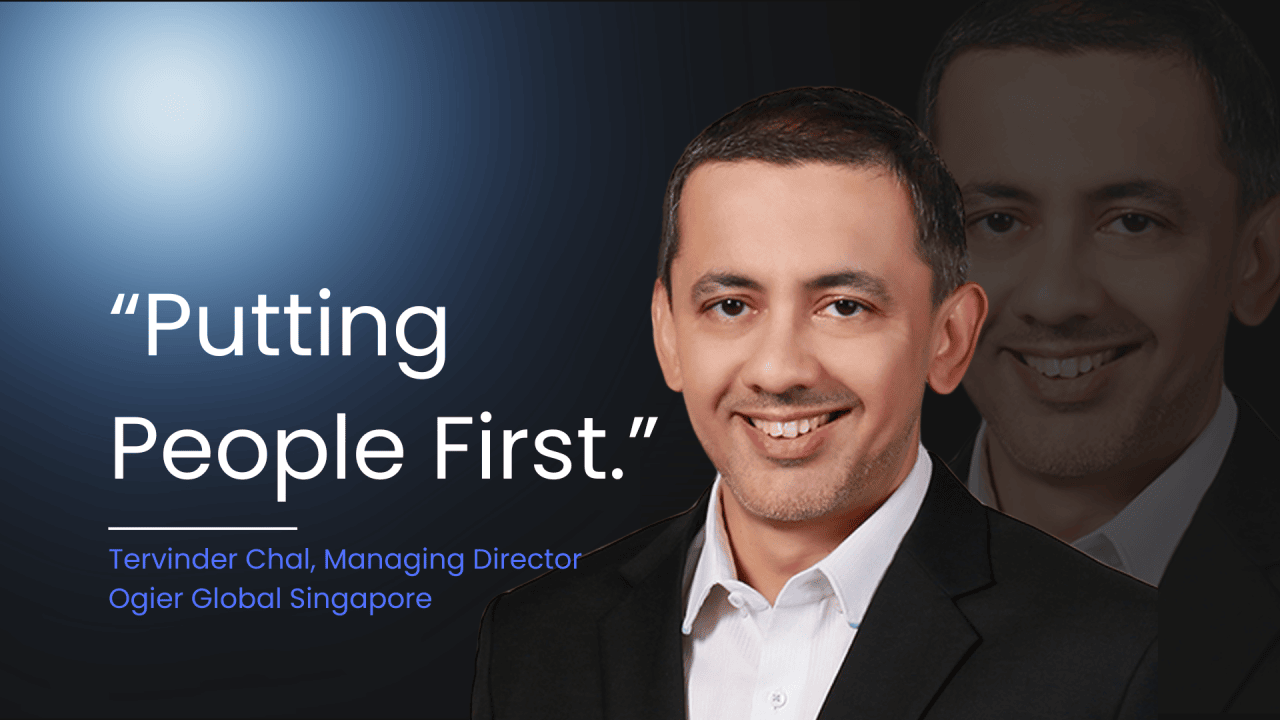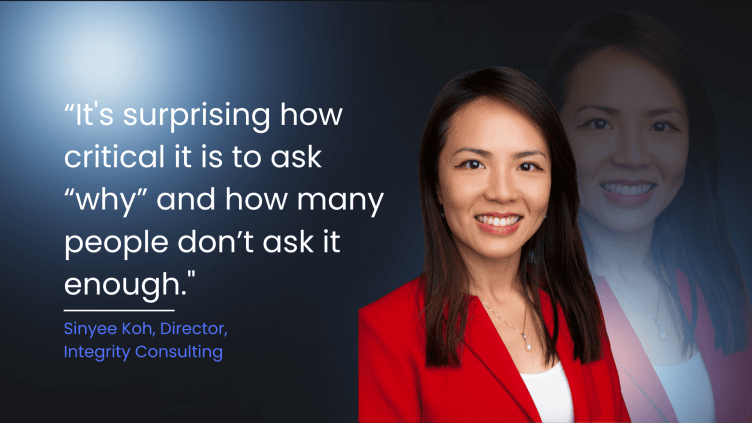Merima Arlebäck has over 20 years in senior roles in the financial services industry, 12 years of experience in the Alternative Investment Management Industry as a Fund of Hedge Funds Portfolio Manager, Senior Research analyst and Investment Committee Member, as well as 10 years working for American Express managing significant corporate accounts. This diverse background has equipped her with invaluable leadership skills and allowed her to thrive in both multinational corporations and boutique environments across Europe and Asia. Most recently Merima served as Country Head for AIMA – The Alternative Investment Management Association Singapore (Alternative Investment Management Association) where she established the Association as a reputable and influential organisation within the local alternatives industry, transforming AIMA from an informal set-up to a one holding a leadership role. She was consulted as trusted facilitator between industry and the regulator (MAS). In her previous roles at Key Asset Management, Natixis Alternative Investments Limited and Key Family Partners, she had the privilege of overseeing diverse portfolios of Fund of Hedge Funds, managing risk, and delivering strong returns to her investors. Merima is highly familiar with the end-to-end hedge fund selection process and her responsibilities required a deep understanding of complex financial instruments, rigorous due diligence, and a keen eye for market trends. She has conducted due diligence on the most well-known Hedge Funds in the industry to Managers going it alone and in need of seed capital requiring a completely different type of analysis and due diligence. Throughout her career, she has developed a proven track record of making sound investment decisions in both stable and volatile markets.
Merima has consistently exceeded targets and expanded client bases through her strong networking skills and comprehensive understanding of client needs. Her ability to cultivate and maintain long-term relationships with high-net-worth individuals, institutional investors, and key stakeholders has been instrumental in all of her previous roles.
Having resided in eight countries and worked in five, Merima possesses both cultural adaptability and has a penchant for taking risks. Each experience has required her to begin anew, showcasing her ability to embrace change and thrive in diverse environments. Merima’s immediate family of four does not have one member of the family borne in the same country and the family also have background in two major religions which has made it easy to fit in everywhere they have lived.
With a Master’s exam in Business Administration and economics from Lund’s University in Sweden (that just received the Nobel Prize in Physics). Merima believes in long-term success through advocacy and constant professional development through education. She completed the Fund Directors Certification end of 2023 with SFDA, Singapore Fund Directors Association, and she also just completed Deloitte’s Global Boardroom Program. Merima took the CAIA Level one exam in March of this year which and she recently found that it was a pass. She says it is definitely one of the most demanding exams she has experienced.
Here are some key attributes and qualifications.
• Comprehensive Due Diligence perspective: Merima has conducted thorough due diligence on a wide range of hedge funds, assessing their investment strategies, risk management practices, and performance history. This due diligence process involves in-depth quantitative and qualitative analysis, ensuring that investment decisions align with institutional goals.
•Diverse Investment Experience: Merima’s experience in managing diverse portfolios of Fund of Hedge Funds has honed her ability to assess various investment strategies, manage risk, and make informed decisions.
•Effective Communication: Merima possess strong communication, networking and interpersonal skills.
Mike Sim (MS): What were some of the biggest challenges you faced when you first arrived in Singapore, and how did you overcome them?
Merima: With our return to Singapore the second time after nearly four years away, the transition was initially challenging due to the introduction of numerous new rules and regulations amid the COVID-19 pandemic, including a mandatory two-week quarantine. This period also coincided with what appeared to be a more protectionist stance towards expatriates, complicating the job search process and the ability to get any type of work permit.
Despite these hurdles, the unwavering positivity and enthusiasm of our children—who had spent most of their lives in Singapore and eagerly reunited with their friends and familiar school environment— greatly influenced our outlook. Their seamless adaptation and contentment reassured us that returning to Singapore was the correct decision. We have always appreciated the safety, community, and quality of life here, and it continues to feel like home.
While job search challenges still persist, particularly regarding employment opportunities for expatriates, I remain optimistic. I believe in the possibility of overcoming these obstacles through continuous networking, perseverance and adaptability. I find myself fortunate to have friends working in the city and through one of them, Martin O’Regan, I have become involved in Singapore Fund Directorship Association, SFDA, and especially with an inspiring group of Women in the DEI sub-committee.

Merima with Valerie and Corina, graduating from Deloitte Board-Ready Women Program 2024
Mike Sim (MS): As a foreigner, how did you adapt to the cultural differences between your home country and Singapore? Can you share any interesting anecdotes or experiences?
Merima: Singapore was the seventh country I moved to in my life. When working for American Express I travelled frequently and had already visited Singapore two times before so at this point, I was not so easily surprised. However, that said adapting to the linguistic diversity and learning the dining etiquette at hawker centres were among the initial cultural challenges I encountered. An incident occurred when I attempted to integrate the local slang “lah” into my everyday speech and maybe somewhat too much, often misplacing it in sentences. This led to some quite light-hearted interactions and valuable lessons from locals (especially from very nice uncle taxi drivers) on its appropriate use, enhancing my understanding of “Singlish”. For example, when it is used to strengthen a statement like “Don’t worry, lah” which means “Really, don’t worry”.
Another aspect I deeply appreciate is Singapore’s rich culinary landscape which is really different from any other country I have lived in. The vast array of dining options not only caters to every palate and budget but also creates a lively social atmosphere, with people enjoying the outdoors far beyond just weekends.
This bustling energy, supported by the tropical climate, I believe underscores the city’s dynamic character, making it a uniquely enjoyable place to live.

Merima speaking at events
Mike Sim (MS): What aspects of Singaporean culture and lifestyle do you find most fascinating or unique compared to your home country?
Merima: For me one of the most captivating aspects of Singaporean culture is the truly harmonious blend of ethnic diversities. This rich variety of people and cultures is deeply respected in everyday life and celebrated through all the vibrant festivals and diverse culinary offerings.
The communal spirit within Housing Development Board (HDB) communities is another example of a big cultural difference with my home country, Sweden. It provides a stark contrast to the isolation often experienced by the elderly. These estates foster a sense of belonging, where seniors can easily find companionship and engage socially around the communal food courts, creating a vibrant village life.

A view of Singapore government housing (HDB)
Another unique and for me very endearing cultural feature is the common practice of addressing elders and strangers as ‘uncle’ and ‘auntie.’ This form of address really fosters a familial atmosphere, creating a sense of community and respect that extends beyond personal acquaintances. Whether conversing with a taxi driver or purchasing vegetables at a food court, these terms of respect contribute to the warm, inclusive environment that characterizes Singapore. It’s a practice that enriches social interactions and one that I truly admire, and hope continues to thrive.
I feel such a deep connection with the local culture; it resonates with me so strongly that I sometimes joke I must have been Singaporean in another life.
Mike Sim (MS): How has your perception of Singapore evolved since your first visit? Are there any surprises or unexpected discoveries you’ve made along the way?
Merima: Initially perceived as a strictly business-centric city and some people say a bit boring, I find it quite contrary and have discovered Singapore’s vibrant arts scene, all of its beautiful green spaces, and rich heritage areas like Tiong Bahru, China town and little India, which has revealed the city’s multifaceted charm.
Mike Sim (MS): Can you share any memorable experiences or favourite spots in Singapore that have left a lasting impression on you?
Merima: Everyone who knows me, know that my absolute favorite spot in Singapore is the Botanical Garden. I missed it tremendously when we left Singapore the first time. I think it is safe to say that it is one of the most beautiful, interesting and well-kept botanical gardens in the world. I am there almost every day, either for my morning run or on morning/ evening walks.

A photo of the Singapore Botanical Gardens
At this very moment I am there every morning to check on a baby Nightjar and her mummy and talking to locals sharing wildlife stories. You just have to put your phone away to be able to see something beautiful, interesting and hear all the amazing sounds of tropical wildlife. Although, I was once chased by a monkey on one of my runs thinking I had food in my pouch … I think I was heard across Singapore screaming which even scared the poor baby monkey. The Botanical Garden truly has healing powers and puts me in the best mindset.
Mike Sim (MS): What advice would you give to someone who is planning to move to Singapore for work or study, particularly in terms of adapting to the local culture and lifestyle?
Merima: Embrace the local norms and be open to trying new things, whether it’s food or festival celebrations. The easiest thing is to join your countrymen abroad, but I believe, when you move as far as we have done, that you gain a lot more by making an effort of joining local communities or interest groups which can also help in settling down more comfortably. I did a four-day value-investing course with me as the only non-Singaporean last year. A community I still value and ask for advice.
Mike Sim (MS): As someone who has navigated the business landscape in Singapore, what are some key insights or tips you would offer to newcomers looking to establish themselves professionally here?
Merima: Networking is vital, and so is understanding the regulatory framework. Being aware of the local business etiquette, such as the importance of face-to-face meetings and timely follow-ups, can set you apart.
Mike Sim: What are some common misconceptions about doing business in Singapore that you’ve encountered, and how would you address them?
Merima: A common misconception is that Singaporean business culture is rigid. However, I found that while there is a respect for hierarchy, there is also a strong emphasis on meritocracy and innovation.
Mike Sim: How do you find the business environment in Singapore compared to other countries you’ve worked in? What are some advantages and challenges?
Merima: Singapore offers a highly supportive ecosystem for businesses, marked by strong governmental support. The support can come in the form of financial incentives, subsidies, tax breaks and grants that can help reduce the operational costs for businesses. Singapore’s geographical location is also strategically important for international trade. Situated at the crossroads of major shipping routes in Southeast Asia, and being one of the world’s busiest ports, it facilitates easy access to markets in the Asia-Pacific region and beyond. I would say this makes it an ideal location for companies that depend on import and export activities.

2016 – Merima with Laura Seah in AIMA
The challenges may include navigating the cost of living and business operations as well as the ability to work for the trailing spouse. The spouse typically needs to obtain their own work permit or employment pass to work legally and the criteria for these permits can be strict, often requiring the employer to justify hiring a foreigner over a local candidate, which can be a hurdle in a competitive job market. Even though I have the right to work in Singapore I am still struggling for work opportunities. So, if you thrive in a work environment these are some challenges that you will have to take into account.
Mike Sim (MS): Can you discuss any cultural nuances or etiquettes that are important to be aware of when conducting business in Singapore?
Merima:Understanding the importance of respect and saving face I believe is crucial.
Having worked in the financial industry in London for many years where communication tends to be direct, I do find a good tip is that in Singapore it tends to be more indirect in nature.
It’s important to learn to read between the lines and pay attention to non-verbal cues. I would also be very careful with open confrontation as this is generally avoided. Preserving harmony in general is very important.
I quite often find that Initial meetings here might be more about getting to know each other than making firm decisions. Again, it is about building trust and rapport before proceeding to serious business discussions. Understanding decision-making is also an important one as it can be hierarchical but often involves seeking consensus among all involved parties, so it is crucial to be patient and not push for immediate answers during negotiations.

Meeting with AIMA ExCo Committee (2014)
Lastly, small gestures, like handing over a business card with both hands, can make a significant difference in business interactions. Understanding to these cultural nuances in Singapore not only shows respect but can also help facilitate as well as give you more productive business meetings.
Mike Sim (MS): What role do you think cultural diversity plays in shaping Singapore’s business landscape, and how has it influenced your own experiences?
Merima: Cultural diversity is and should continue to be a cornerstone of Singapore’s business landscape, as it offers a broad perspective and fosters an inclusive environment. For me in general it has not only enriched my professional experiences as colleagues with different backgrounds have brought unique insights or creative solutions to problems that have come up which might not be the case in more homogenous environments. It has also really enriched my personal experiences through the friendships I have made all over the world. I do believe that diversity whatever it might be, gender, age, culture contributes enormously to creating more dynamic and innovative workplaces.
Mike Sim (MS): Have you had any experiences of cultural shock or misunderstandings during your time in Singapore, and how did you navigate them?
Merima: Having lived in London for 8 years and elbowed my way into the tube, experiencing public transport etiquette in Singapore was initially a shock, particularly the discipline in queues. Luckily I am a quick learner….
Mike Sim (MS): What strategies have you found effective for building strong relationships and networks within the Singaporean business community?
Merima: Participating in local business events, seminars and forums have been instrumental. Gaining peoples trust slowly and by being genuinely interested in learning from others and sharing experiences I have found helps in forming lasting connections.
Mike Sim (MS): What are some cultural traditions or celebrations in Singapore that you’ve found particularly interesting or enjoyable, and how have they enriched your experience?
Merima: The Chinese New Year and Diwali celebrations I find particularly enriching, showcasing traditions that are both spectacular and deeply meaningful. It really makes me so happy to decorate my house for Chinese New Year. It is such a colourful celebration, and we are lucky to be able to celebrate with friends that have become like family. Eating “Lohei” is an absolute must.

2016 -Merima capturing the moment of the amazing lion dance.
Mike Sim (MS): Looking ahead, what are your aspirations or goals for your continued journey in Singapore, both personally and professionally?
Merima: Look in the end my aspiration is to be in a professional role that I find fulfilling intellectually and work with people that inspire and challenge. I have always been passionate about the alternative industry as it is one where learning never ends. Until I find that position, I challenge myself with CAIA level 2 and commit fully to an amazing organization, SFDA, and specifically the DEI sub-committee, with an ultimate goal of not only increase the readiness and number of female Independent Directors in Singapore but also work towards these women being able to get hired.
Personally, I am currently also looking into a more local charity where I would be able to contribute both time and compassion.
Mike Sim (MS): What is one question you wish I have asked you, and how would you have answer it?
Merima: “How do you see the evolution of the financial sector in Singapore impacting global markets?”
- I would discuss the innovative trends in fintech like Singapore being a pioneer in promoting cashless payments, with a highly integrated system of e-wallets and mobile payments platforms or how Singapore has embraced blockchain technology, fostering its use in everything from cross-border payments to trade finance and record-keeping. This leadership in blockchain application is helping set global standards for this technology’s use in the financial sector to name a few Fintec innovations.
- I would continue discuss sustainable investing emerging from Singapore, setting new standards globally. Singapore has become a hub for the issuance of green bonds, which are used to finance projects with environmental benefits. The MAS has also launched initiatives like the Green Bond Grant Scheme to support sustainable investment.
- I would also discuss the increasing focus on integrating Environmental, Social, and Governance (ESG) factors into investment decisions. Singapore’s financial sector plays a critical role in promoting ESG integration by developing frameworks and standards that are being adopted internationally.
Mike Sim (MS): What is your sound bite?
Merima: “In conducting due diligence, it’s not the information they give you that is the most important, it is the information that is omitted that is crucial.” It’s a detective’s job…
Anyone can do due diligence ticking boxes however it is so much more. It is about daring to have discussions with Portfolio Managers, traders, COO’s, CCO’s, CFO’s, third parties etc.
It is also about knowing how to find the information not being told that might or might not uncover red flags, to finally be able to add that Fund into the Investment Pool of Hedge Fund Managers. It could be crucial information.

Mike Sim with Merima Arlebäck
Thank you, Merima for taking time to share your insights on Embracing Diversity: Insights on Cultural Adaptation in Singapore!
Recent Posts
